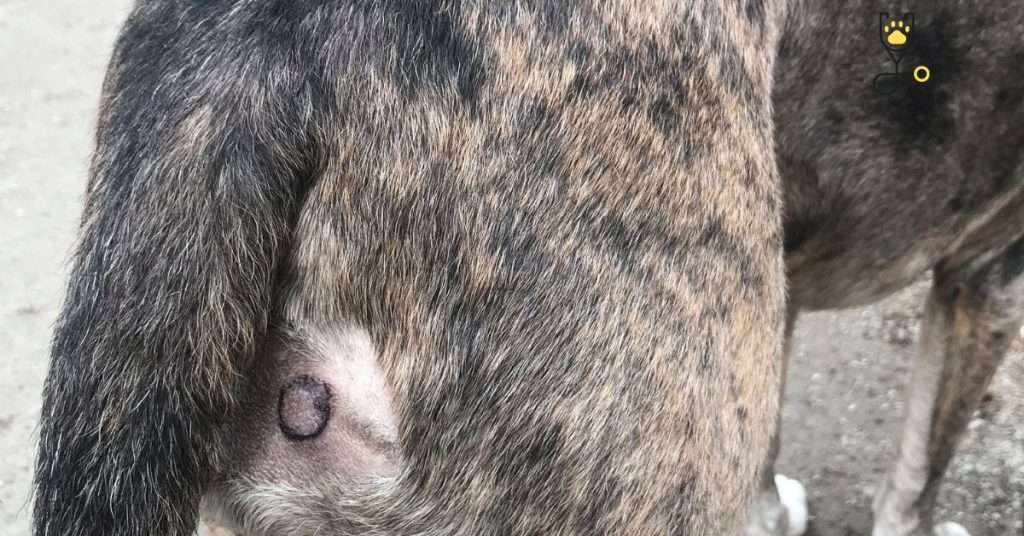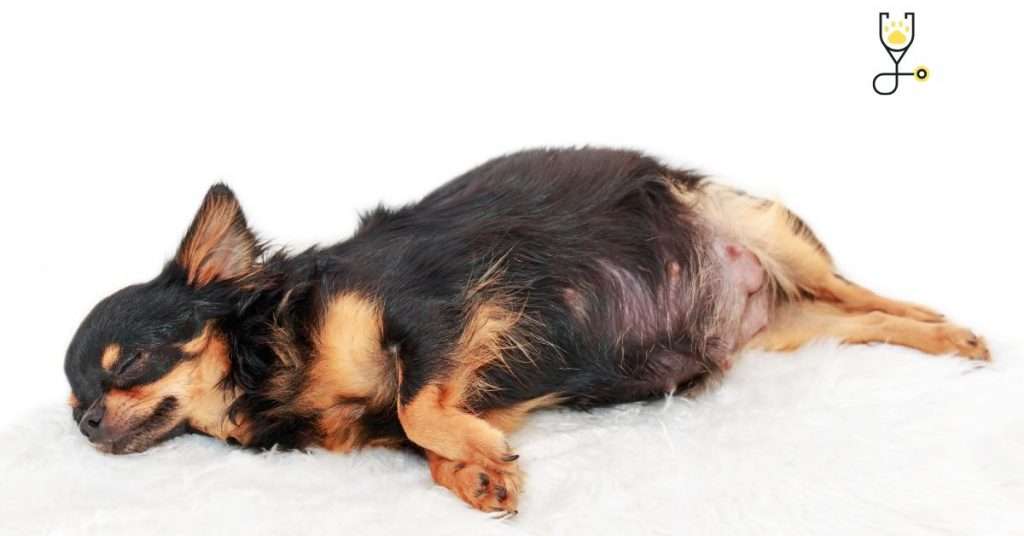Dogs get cysts, tumors, and growths just like people do. While some of these are benign and nothing to worry about, others can be serious. It’s important to know how to recognize the signs of a problem and what treatment is necessary. This blog post will teach you everything you need to know about cysts, tumors, and growth in dogs. Read on to learn more!
What are cysts, tumors, and growths?
Cyst
A cyst is a sac filled with fluid or other material. Cysts can occur anywhere on the body, under the skin, or inside organs. They are usually harmless and do not cause any problems unless they rupture or become infected.

Tumor
A tumor is a mass of abnormal cells that grow out of control. Tumors can be benign (non-cancerous) or malignant (cancerous). Benign tumors are not usually a problem and do not spread to other parts of the body. However, malignant tumors can be very dangerous and can spread to other parts of the body, which can be life-threatening.
Learn More: Why Is My Dog Vomiting White Foam And Not Eating?

Growth
Growth is an abnormal mass of tissue that can be benign or malignant. Growths can occur anywhere on the body and can be either single or multiple. They are usually not cancerous, but some can become cancerous over time.
What are the signs of a problem?
The following are some signs that a cyst, tumor, or growth may be causing problems:
Change in size: If the cyst, tumor, or growth increases in size, it may be a sign that it is growing out of control and needs to be checked by a veterinarian.
Change in shape: If the cyst, tumor, or growth changes shape, it may be a sign that it is becoming cancerous and needs to be checked by a veterinarian.
Change in color: If the cyst, tumor, or growth changes color, it may be a sign that it is becoming cancerous and needs to be checked by a veterinarian.
Pain: If the cyst, tumor, or growth is painful, it may be a sign that it is infected or ruptured and needs to be checked by a veterinarian.
Inflammation: If the area around the cyst, tumor, or growth is inflamed, it may be a sign that it is infected or ruptured and needs to be checked by a veterinarian.
Tenderness: If the area around the cyst, tumor, or growth is tender to the touch, it may be a sign that it is infected or ruptured and needs to be checked by a veterinarian.
Iitching: If the cyst, tumor, or growth is itchy, it may be a sign that it is infected or ruptured and needs to be checked by a veterinarian.
Causes of cysts, tumors, and growths in dogs
There are many causes of cysts, tumors, and growths in dogs. Some of the more common include:
- Hormonal imbalances
- Infection
- Stress
- Pregnancy
- Puberty
- Certain medications
Hormonal imbalances
One of the most common causes of cysts, tumors, and growths in dogs is an imbalance in their hormones. This can be caused by a number of things, including but not limited to: infection, stress, pregnancy, puberty, and certain medications.
Infection
Another common cause of cysts, tumors, and growths in dogs is infection. This can be caused by bacteria, viruses, fungi, or parasites. Infections can occur anywhere on the dog’s body but are most commonly found in the reproductive organs, skin, and ears.
Stress
Stress can also cause cysts, tumors, and growths in dogs. When a dog is under a lot of stress, its body goes into “survival mode” and starts to produce excess hormones. These hormones can cause the growth of cysts, tumors, and growths.
Pregnancy
Pregnancy is another common cause of cysts, tumors, and growth in dogs. During pregnancy, the dog’s body produces a hormone called progesterone. This hormone can cause the growth of cysts, tumors, and growths.
Read More: Hyperthyroidism In Dogs! And How To Treat It?

Puberty
Puberty is another common cause of cysts, tumors, and growth in dogs. During puberty, the dog’s body goes through a lot of changes and starts to produce more hormones. These hormones can cause the growth of cysts, tumors, and growths.
Certain medications
Certain medications can also cause cysts, tumors, and growth in dogs. These medications include but are not limited to: corticosteroids, estrogen, and testosterone. If your dog is taking any of these medications, please speak with your veterinarian about the risks involved.
Prevention of cysts, tumors, and growths in dogs
There are a few things that you can do to help prevent cysts, tumors, and growths in your dog. These include:
spaying or neutering your dog: This will help to balance your dog’s hormones and prevent the growth of cysts, tumors, and growths.
Keeping your dog up to date on their vaccinations: This will help to prevent infections that could cause cysts, tumors, and growths.
Feeding your dog a healthy diet: A healthy diet will help to keep your dog’s immune system strong and prevent the growth of cysts, tumors, and growths. Diet includes:
- Canned food
- Dry food
- Raw food
- Bones and Raw Food Diet (BARF)
Regular visits to the veterinarian: Regular check-ups with your veterinarian will help to catch any problems early and prevent the growth of cysts, tumors, and growths.
Exercising your dog: Exercise will help to keep your dog’s body healthy and prevent the growth of cysts, tumors, and growths.
Treatments for cysts, tumors, and growths in dogs
There are a few different treatments for cysts, tumors, and growths in dogs. These include:
Surgery: This is the most common treatment for cysts, tumors, and growths in dogs. Surgery involves removing the cyst, tumor, or growth and any surrounding tissue.
Chemotherapy: This treatment uses drugs to kill the cancer cells. It is usually used in combination with surgery. Drugs include:
- 5-fluorouracil
- Doxorubicin
- Cyclophosphamide
- Vincristine
Radiation therapy: This treatment uses high-energy waves to kill cancer cells. It is usually used in combination with surgery.
Learn More: My dog broke its toe! What should I do?

Immunotherapy: This treatment uses the dog’s immune system to fight the cancer cells. It is usually used in combination with surgery.
Prognosis
The prognosis for dogs with cysts, tumors, and growths depends on the type of growth, the size of the growth, the location of the growth, and the stage of the growth. The earlier the growth is found, the better the prognosis. Surgery is often successful in treating cysts, tumors, and growths. If the growth is cancerous, the prognosis depends on the type of cancer and how advanced it is. If the cancer is caught early, the prognosis is good. However, if cancer has spread to other parts of the body, the prognosis is poor.
Conclusion
Cysts, tumors, and growths are common problems in dogs. They can be caused by a variety of factors, including stress, pregnancy, puberty, certain medications, and infection. There are a few things that you can do to help prevent cysts, tumors, and growths in your dog. These include spaying or neutering your dog, keeping your dog up to date on their vaccinations, feeding your dog a healthy diet, and exercising your dog. If your dog does develop a cyst, tumor, or growth, there are a few different treatment options available. These include surgery, chemotherapy, radiation therapy, and immunotherapy. The prognosis for dogs with cysts, tumors, and growths depends on the type of growth, the size of the growth, the location of the growth, and the stage of the growth. The earlier the growth is found, the better the prognosis. Surgery is often successful in treating cysts, tumors, and growths. If the growth is cancerous, the prognosis depends on the type of cancer and how advanced it is. If the cancer is caught early, the prognosis is good. However, if cancer has spread to other parts of the body, the prognosis is poor.
Read More About Common Dog Diseases & Their Prevention in our Ultimate Guide here.
FAQs
1. What are cysts, tumors, and growths?
Cysts, tumors, and growths are abnormal growths that can occur in dogs. They can be benign (non-cancerous) or malignant (cancerous).
2. What causes cysts, tumors, and growths?
There are a variety of factors that can cause cysts, tumors, and growth in dogs. These include stress, pregnancy, puberty, certain medications, and infection.
3. How can I prevent cysts, tumors, and growths?
There are a few things that you can do to help prevent cysts, tumors, and growths in your dog. These include spaying or neutering your dog, keeping your dog up to date on their vaccinations, feeding your dog a healthy diet, and exercising your dog.
4. What are the treatment options for cysts, tumors, and growths?
There are a few different treatment options available for cysts, tumors, and growths in dogs. These include surgery, chemotherapy, radiation therapy, and immunotherapy.
5. What is the prognosis for dogs with cysts, tumors, and growths?
The prognosis for dogs with cysts, tumors, and growths depends on the type of growth, the size of the growth, the location of the growth, and the stage of the growth. The earlier the growth is found, the better the prognosis. Surgery is often successful in treating cysts, tumors, and growths. If the growth is cancerous, the prognosis depends on the type of cancer and how advanced it is. If the cancer is caught early, the prognosis is good. However, if cancer has spread to other parts of the body, the prognosis is poor.
6. Are there any homeopathic treatments for cysts, tumors, and growths?
There are a few homeopathic treatments that may be helpful for treating cysts, tumors, and growths. These include calendula, echinacea, and milk thistle. However, it is important to speak to your veterinarian before starting any homeopathic treatment.